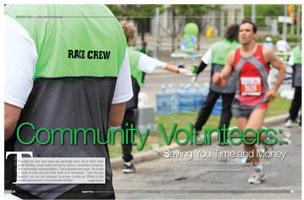
The sites for your next event are narrowed down, all of which have great facilities, ample hotel and dining options, convenient locations, and resourceful representatives. The proposals look good, the board is ready to vote, and you have done your homework. Then the one question you are not prepared to answer comes up: Where is the closest laundry mat to this particular facility?
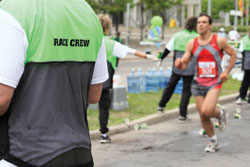 If you had not been so busy researching and collecting information, you would have heard the story of how a team mom spent two hours the previous Friday night driving around a strange town looking for a place to wash the team's uniforms. Now you wish you had listened in on the group's small talk as you stumble to find a response. Suddenly, you remember that a knowledgeable group of community volunteers will be available in that city, and you reply, "That's a question the Host Family will be on hand to answer."
If you had not been so busy researching and collecting information, you would have heard the story of how a team mom spent two hours the previous Friday night driving around a strange town looking for a place to wash the team's uniforms. Now you wish you had listened in on the group's small talk as you stumble to find a response. Suddenly, you remember that a knowledgeable group of community volunteers will be available in that city, and you reply, "That's a question the Host Family will be on hand to answer."
Some of the challenges facing sports event planners are not unique to sporting events; finding the most affordable destination that meets the criteria, pleasing as many of the attendees as possible, increasing the number of participants, and making the event smooth and memorable. General meeting planners, however, do not worry so much about things like getting all of the competitors to the match on time, knowing where the nearest hospital is located, creating and building the wow-factor for your event, and working around the limited travel budgets of most sports teams.
As a former student athlete and experienced group traveler, Amy Cardwell knows the obstacles that come with an out-of-town tournament. On one trip, she recalls how she and her 20 teammates sat in their hotel rooms all afternoon with nothing to do, never knowing there was a shopping mall right around the corner. On another, Cardwell's family drove on and off the interstate for hours looking for an open restaurant after a long day on the field.
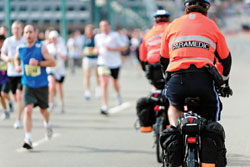 How about trying to find the hospital at 2 a.m. in a strange city after being out in 100-degree weather, only to find out that you need surgery and you do not even have a toothbrush! In what was supposed to be a one-day tournament, Mother Nature and some long games caused the competition to last through the night. Add to the mix a head first slide into third and catching a size 13 cleat in the nose and you have the components for a very interesting few days.
How about trying to find the hospital at 2 a.m. in a strange city after being out in 100-degree weather, only to find out that you need surgery and you do not even have a toothbrush! In what was supposed to be a one-day tournament, Mother Nature and some long games caused the competition to last through the night. Add to the mix a head first slide into third and catching a size 13 cleat in the nose and you have the components for a very interesting few days.
It happened, just as inaccurate Internet directions resulted in a 20-minute drive to the court when a couple of turns would have put them there in five. Based on these and many other mishaps, when Cardwell took over as Sports Sales Director for the Bowling Green Area Convention and Visitors Bureau, she knew one program she definitely wanted to keep: the group of volunteers who participate in the Host Family Program.
Consecutively since 1991, Bowling Green has hosted one of the state's largest athletic events; the Houchens Industries/ Kentucky High School Athletic Association Girls' Sweet Sixteen Tournament. Businesses all across town prepare for the tens of thousands of people who visit for the prestigious event, while Cardwell is busy with hotel preparations, marketing the tournament and collecting items for each team's goodie bag. Arena management personnel at Western Kentucky University have their hands full going over daily schedules so things run smoothly at E.A. Diddle Arena.
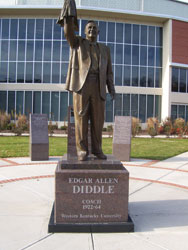 For 16 very special families who participate in the Host Family Program, March is a time to roll out the red carpet for their respective region's winning team. The program matches one very giving, enthusiastic and community-centered family with each of the teams traveling to Bowling Green for the tournament. From simple tasks such as making dinner reservations to cheering their teams on from behind the bench, these hosts are truly a testament to the hospitality of the community.
For 16 very special families who participate in the Host Family Program, March is a time to roll out the red carpet for their respective region's winning team. The program matches one very giving, enthusiastic and community-centered family with each of the teams traveling to Bowling Green for the tournament. From simple tasks such as making dinner reservations to cheering their teams on from behind the bench, these hosts are truly a testament to the hospitality of the community.
The Host Family's job starts right after the regional championships, usually with a congratulatory call to the winning school's athletic department and coaches. Next, it is on to the team's hotel to meet them upon arrival, where shortly after the welcomes and introductions go around, the coaches quickly store the host family's contact numbers in their cell phones. For the next few days, having these numbers helps relieve a lot of stress that comes with being in the state tournament.
David and Miki Wiseman, who have been part of the program for over 10 years, said some of the ways they help to put the team at ease is by securing practice sites or setting up meals. "One year, we had to assist a player with getting in to see a doctor. She had flu symptoms and was physically drained," David explained. Being such great hosts, not only did they find a doctor, they knew of an area physician who was originally from the team's hometown!
It is more than being a community liaison though; the responsibilities come with a sense of pride. Gary and Sharon Dillard have been hosting a team for many years, and Gary said Bowling Green's Host Family Program is known across the state. "It got started when the city hosted the Sun Belt Tournament years ago," he continued. "It was received so well, we decided to continue doing it for the Houchens/KHSAA Sweet Sixteen Tournament because it truly sets Bowling Green apart."
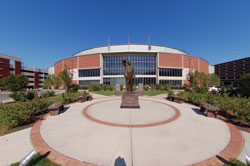 Not only is there a huge amount of community pride involved, there are other rewards for the Host Families. The Wiseman's team won the tournament last year, and they said seeing the players' excitement is probably their fondest memory of all. For the Dillards, their team was first runner up and they received a signed basketball and flowers from the players as a token of gratitude. "We hear stories of different players and teams, the hardships they've overcome. It is just fantastic that they get the opportunity to play in the tournament, and we are so happy to support them," said Gary.
Not only is there a huge amount of community pride involved, there are other rewards for the Host Families. The Wiseman's team won the tournament last year, and they said seeing the players' excitement is probably their fondest memory of all. For the Dillards, their team was first runner up and they received a signed basketball and flowers from the players as a token of gratitude. "We hear stories of different players and teams, the hardships they've overcome. It is just fantastic that they get the opportunity to play in the tournament, and we are so happy to support them," said Gary.
The ability of a host community to produce a volunteer staff can also be converted to hard dollars in savings for an event. Cardwell notes how some communities may not have large enough budgets to be able to cover sizeable bid fees but have perfect facilities. Have you ever looked over a city because they just could not write a check to cover the cost of your event, then received the report that your tournament participation numbers are dropping?
Instead of the community, and most likely the event, losing a terrific opportunity, convert volunteer hours to hard dollars. Having free labor instead of paid event employees cuts costs and typically adds hometown flavor to the event. The CVBs and Sports Commissions that are large enough to write those big checks may not necessarily be the best fit for the event. Maybe the event only draws 7,000 spectators;do you want them in a stadium that seats 60,000? The event deserves intimacy and intensity. Therefore, for that particular event, a smaller setting would be more conducive.
Event sponsors want to know they have put their money into a worthwhile endeavor that is garnering them exposure. Not only do volunteers bear their company logo on their shirts all throughout the event, but well-trained volunteers can answer specific questions about the business. Cardwell prepares the host families to be able to answer questions and share specifics about the culture and background of sponsors. This adds to the overall value of the financial commitment, and works just as effective as an expensive advertisement.
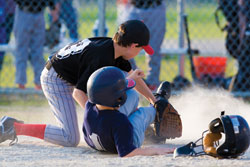 Time is also money, and event organizers usually have other issues to handle rather than giving directions, making reservations, and locating movie theaters and other recreational venues. Volunteers are the perfect solution. As residents, they can answer questions quickly, rather than having to ask around. For Cardwell, she can focus on the overall success of the tournament and ensure sponsor satisfaction instead of having to answer every phone call.
Time is also money, and event organizers usually have other issues to handle rather than giving directions, making reservations, and locating movie theaters and other recreational venues. Volunteers are the perfect solution. As residents, they can answer questions quickly, rather than having to ask around. For Cardwell, she can focus on the overall success of the tournament and ensure sponsor satisfaction instead of having to answer every phone call.
Another point Cardwell makes is that with each new volunteer you involve in an event comes several new contacts and the ability for trade with vendors or paybacks. For example, a volunteer may have a contact that can provide walkie-talkies free instead of having to pay for rentals. One of the hosts in Bowling Green opened up his private barn, which held a full-size basketball court, for practice when all the other gyms were unavailable. When a person is passionate enough about their community or particular sport to volunteer, what they give is much more than a paid employee.
Volunteers also make the town come alive so it becomes more than just a facility. Sharing local lore, interesting facts and the history of the area all bring an educational component to an event. Visiting teams probably do not have the time to visit museums, heritage sites, or explore significant districts, but they can return home with the feeling that they did. The knowledge and insight volunteers provide can make the participants feel more welcome and comfortable if they visit in the future.
 Teams have many choices now of which tournaments to compete in and with which association. Making the right site selection is vital to growing, or continuing to grow, the sport or association. Teams are more likely to show patronage when they have enjoyed themselves at an event. This is where the volunteers are vital and generate future dollars for the event. If a volunteer is able to ease a hospital stay, give directions around traffic jams, assist with reservations, recommend a laundry service in a nice part of town, teams are more likely to return to your tournaments.
Teams have many choices now of which tournaments to compete in and with which association. Making the right site selection is vital to growing, or continuing to grow, the sport or association. Teams are more likely to show patronage when they have enjoyed themselves at an event. This is where the volunteers are vital and generate future dollars for the event. If a volunteer is able to ease a hospital stay, give directions around traffic jams, assist with reservations, recommend a laundry service in a nice part of town, teams are more likely to return to your tournaments.
Everyone wants their event to be the best, and for that to happen, the entire host community needs to embrace it. Not every event is the Super Bowl or the World Series, but every event deserves to feel like it. When a community is serious about sports events then they will have a group that stands out above the rest with pride and enthusiasm. These valuable volunteers will want to work to make every event special and share their community as they see it. That is how you grow events, it is not always about providing monetary support; it is about creating an experience.
From Tee Ball to the NCAA, every athlete wants to look into the crowd and see someone cheering for them. With the growing cost of travel, especially in hard economic times, that may not always be possible. Nevertheless, as long as there are fields and hoops, there will be games. Adding volunteers to your roster helps make your team more competitive. When a team and coaching staff are participating in a tournament, volunteers allow them to be able to concentrate on just that --- coaching and playing.


